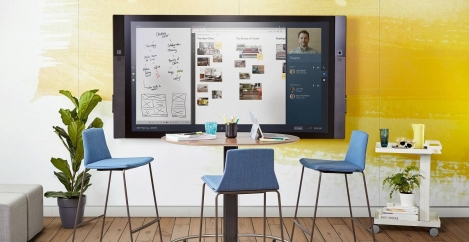July 27, 2017
British businesses at risk of creativity crisis, according to new Microsoft research
 British businesses are at risk of a creativity crisis due to workplace cultures that stifle innovation, according to new research launched by Microsoft Surface. Uninspiring workplaces (41 per cent), a stressful atmosphere (34 per cent) and a lack of appropriate spaces to focus and think alone (28 per cent) were all identified as major inhibitors to creativity. Two in five workers surveyed (40 per cent) say that creativity and innovation are neither encouraged nor rewarded within their workplace – despite creativity being one of the top three skills workers will need to thrive by 2020, according to the World Economic Forum. The research, based on the views of more than 1,100 workers, found that whilst almost three quarters of respondents (73 per cent) consider themselves to be creative, demands of the modern workplace need rethinking, with symptoms such as overworking and stress stifling our ability to tackle problems and produce good ideas. Half of workers (50 per cent) feel least creative when tired, 45 per cent when stressed, while existing workloads (39 per cent) and organisational processes (32 per cent) were also cited as barriers to employees being more creative.
British businesses are at risk of a creativity crisis due to workplace cultures that stifle innovation, according to new research launched by Microsoft Surface. Uninspiring workplaces (41 per cent), a stressful atmosphere (34 per cent) and a lack of appropriate spaces to focus and think alone (28 per cent) were all identified as major inhibitors to creativity. Two in five workers surveyed (40 per cent) say that creativity and innovation are neither encouraged nor rewarded within their workplace – despite creativity being one of the top three skills workers will need to thrive by 2020, according to the World Economic Forum. The research, based on the views of more than 1,100 workers, found that whilst almost three quarters of respondents (73 per cent) consider themselves to be creative, demands of the modern workplace need rethinking, with symptoms such as overworking and stress stifling our ability to tackle problems and produce good ideas. Half of workers (50 per cent) feel least creative when tired, 45 per cent when stressed, while existing workloads (39 per cent) and organisational processes (32 per cent) were also cited as barriers to employees being more creative.
Respondents also felt that their organisations were doing little to address the problem. Whilst 49 per cent of employees feel that learning new creativity skills would help them be more effective in their role, three quarters of UK employees (75 per cent) say they have not been offered training to nurture these skills within the past two years.
“Any organisation that believes creativity is the privilege of a few senior execs is missing out on huge opportunities for growth,” says Ryan Asdourian, Windows and Surface Lead, Microsoft UK. “Creativity is everywhere if you know where to look but like all skills, it needs to be nurtured and given the right tools. Businesses must do more to provide employees with the right working environment to handle different kinds of tasks, and the flexibility to get out of the office to spark their creativity. This research shows a clear lack of investment in innovation and creativity training, which is especially alarming when we consider the potential impact to the UK economy. The services sector is vital to UK GDP and its success has been built on our ability to solve problems in new and innovative ways. If UK businesses are not able to find ways to spark creativity within the workplace, they’re at risk of falling behind.”
Scenarios where respondents felt most able to exercise creativity and problem solving were when they had time to themselves (42 per cent), whilst taking a walk (26 per cent) or taking time away from the office by being outdoors (21 per cent).
This survey follows the launch of Steelcase and Microsoft’s Creative Spaces. “The problems people face at work today are much more complex than they used to be. They require a new creative way of thinking and a very different work process,” says Sara Armbruster, vice president of strategy, research and new business innovation for Steelcase. “We believe that everyone has the capacity for creative thinking, and people are happier doing creative, productive work.”
Asdourian concludes: “Helping people and workers improve their creativity is critical to the future of the UK economy, and many businesses and workplaces are not yet set up in ways that reward or foster this skill. To inspire innovation, workers must be equipped with the right training and tools – including devices that enable employees to work where they are most creative yet still collaborate effectively; diverse office spaces for different kinds of working; and a work-life balance that enables them the headspace to think through problems. With these tools, businesses and the UK economy can reap the benefits of a creative workforce.”














